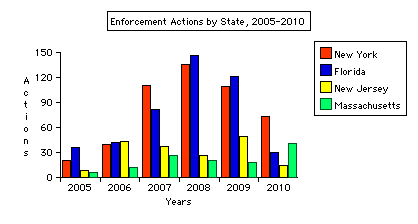The Enforcement Action Database is up-to-date again; so far for the year the FCC is running at blatant record pace with regard to enforcement actions – 235 as of mid-May, while 2009 saw a cumulative enforcement action total of 445. If this pace continues, 2010 may be the first year in which the FCC cracks 500 enforcement actions.
Taking a closer look at the data, the methodology of field enforcement remains the same – lots and lots of station-visits and threatening letters, but nothing in the way of raids and seizures, and very little in the way of monetary penalties. The practice of stats-enforcement is also still in full effect; for example, a whopping four warning letters were sent to different individuals in two states for the same unlicensed FM station in Brockton, Massachusetts.
 Yet, there is a vibrant and growing microradio scene along the east coast of the United States, especially in the northeast. At right is a snapshot of enforcement actions over the last four and a half years involving the four “busiest” (as determined by FCC activity) states on the eastern seaboard.
Yet, there is a vibrant and growing microradio scene along the east coast of the United States, especially in the northeast. At right is a snapshot of enforcement actions over the last four and a half years involving the four “busiest” (as determined by FCC activity) states on the eastern seaboard.
Florida and New York are well-known for being hotbeds of pirate broadcasting (the FCC has about as much chance of “cleaning up” the airwaves as it does of stopping the Earth’s rotation); New Jersey has always been simmering in the shadow of New York; but Massachusetts is showing a real spike in broadcast action.
Part of this increase in activity in Massachusetts can be explained by the FCC’s practice of enforcement statistics-inflation (as noted above) – but not all of it. There’s simply too many individual stations being dinged, and – like in Florida and New York – the tactic of “pass it along” (i.e., give your broadcast gear over to someone else to continue the station after you’ve been outed) appears to have gained traction.
Also of interest is an uptick in the number of unlicensed, low-power AM stations being noticed by the FCC (still puny relative to the aggregate number of FM stations, but growing), as well as what may be the FCC’s first official enforcement action against a shortwave pirate in nearly a dozen years. In addition, Nebraska got on the board for the first time in Enforcement Action Database history this April, with an LPAM station in Omaha receiving an official tap on the shoulder.
As always, the trends demonstrate not so much the quality of FCC enforcement against pirates as it does raw unlicensed activity across the radio broadcast spectrum. It makes for a lot of work for me, but it’s worth it to see that not only do field agents remain under siege in the traditionally heavy geographies of pirate radio, but new geographies are appearing on the FCC’s radar, both in space and spectrum.
Skip to content